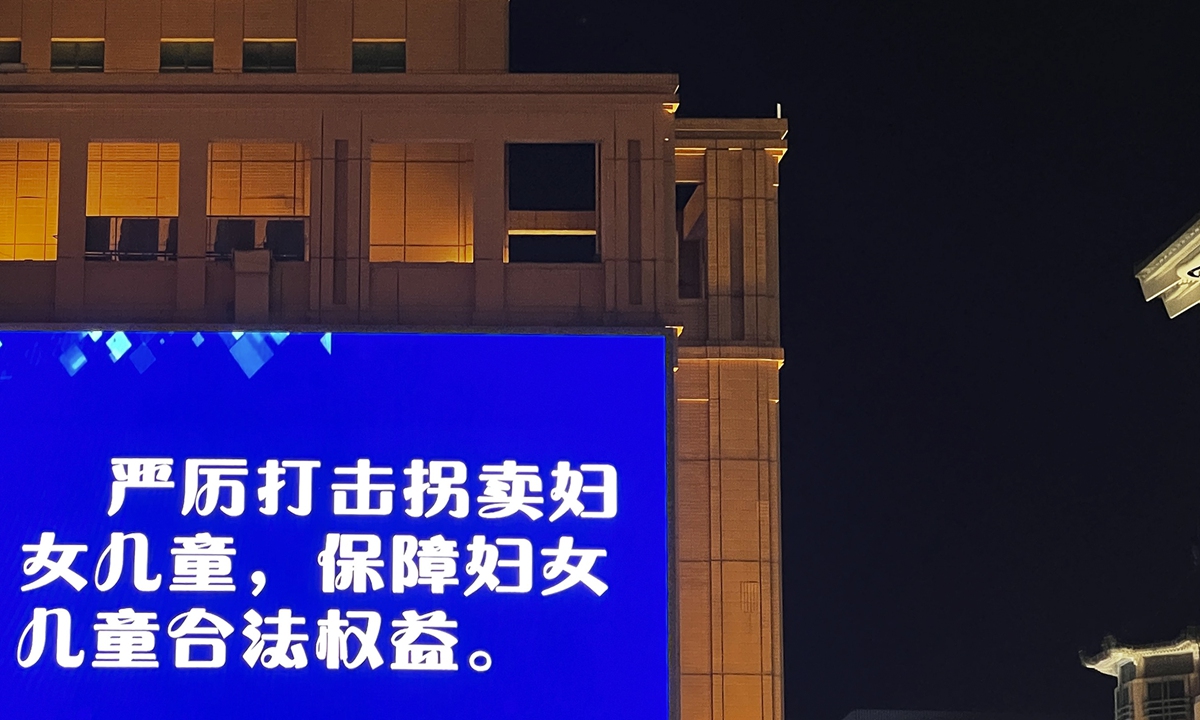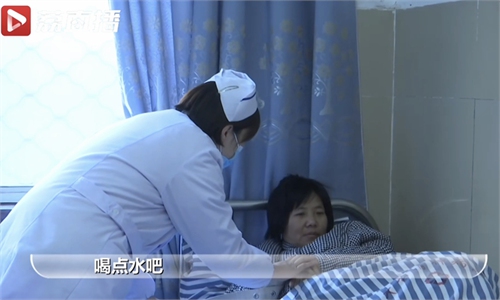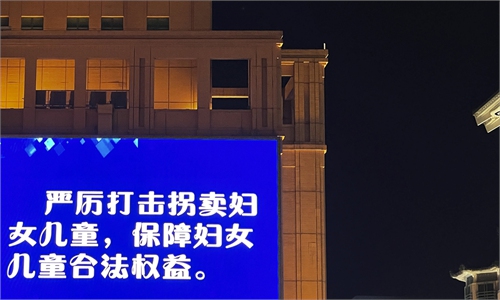Special campaign to crack down on trafficking women, children launched in China
It is hopeful to push through proposals with high social attention: legislator

A screen reads "strictly crack down on abducting and trafficking women and children, protect womenand children's rights." Photo: VCG
China's Ministry of Public Security has launched a special campaign from March 1 to December 31 to crack down on the trafficking of women and children. A teleconference was held by the public security organs across the country on Wednesday for the deployment of the special action throughout the year.
China's Ministry of Public Security has launched a nationwide campaign to crack down on the trafficking of women and children following the recent tragic case of a trafficked woman in East China's Jiangsu Province, which sparked a huge wave of controversy in the country.
Chinese legislators called for heavier punishment for buyers and those complicit in human trafficking cases, with some saying that it is hopeful for the proposals to be implemented with such high public attention.
Public security organs across the country held a teleconference on Wednesday for the deployment of the campaign, which began on Tuesday and will run until the end of the year.
The ministry said the campaign will be an "important task" in 2022, vowing to severely punish the criminals involved in kidnapping and trafficking women and children, and to rescue the victims.
The campaign comes after the case of a trafficked woman in the city of Xuzhou of Jiangsu, and several recent related cases, caused an uproar in China and led to a strong public call for the authorities and society to crack down on the crime of human trafficking.
The ministry's special action was rolled out almost simultaneously with the annual meetings of the National People's Congress (NPC), China's top legislature, and the Chinese People's Political Consultative Conference National Committee, the top political advisory body, collectively known as the "two sessions," which, observers said, provided a window for legislators and political advisors to push forward relevant proposals regarding crimes of human trafficking.
Zhang Baoyan, a deputy to the NPC who is also the founder of a social organization that helps vagrant children to find their biological parents, said that the intense public attention to the crime of trafficking in women and children this year might make it easier to push through some relevant proposals.
Another NPC deputy named Fadima from the Xinjiang region suggested that relevant provisions of the Criminal Law should be amended to make "buying" and "selling" the same crime in human trafficking cases and increase potential jail sentences for the two criminal behaviors.
She proposed that the name of the crime should be changed from "trafficking in women and children" to "illegal trafficking in human beings," and the sentence should be lifted from the current five years to 20 years.
Accomplices in human trafficking cases should also be more severely punished, she added, saying that a key factor for trafficked women or children to be unable to escape from their buyers is the patriarchal system in some uncultured regions that rationalizes the existence of trafficked people in the family.
"We should increase punishment for those who know of but ignore human trafficking, especially village officials, so that they will have high motivation to prevent such crimes," Fadima told the Global Times on Wednesday.
Sharing a similar opinion, Zhang Baoyan suggested that anti-trafficking work should be taken as an indicator of local governments' annual performance evaluations and for those regions where new trafficking cases take place, regional government leaders should be banned from promotion within five years.
Through the efforts of the Ministry of Public Security, human trafficking crimes were effectively curbed in recent years. In 2021, cases of trafficking in women and children dropped by 88.3 percent, compared with 2013. In particular, the number of cases of children being stolen or abducted is less than 20 every year on average, according to the ministry.
But despite that, efforts to crack down on such crimes still need to be strengthened, it said.
The investigation will especially focus on women and children with intellectual impairments, mental illnesses, physical disabilities and those who are vagrants and beggars on streets with unknown origins, said the ministry.
Abducting and selling women is essentially objectifying women, as many of them are forced to marry the buyers or coerced into prostitution, during which women often suffer from terribly serious mental and physical abuse, said NPC deputy Jiang Shengnan.
In her proposal, Jiang suggested that marriages and adoptions arising from the purchase of a woman or child shall be taken as void as they are against the law and the true will of the victims.
Jiang called for a nationwide and long-term search and rescue of trafficked women, especially in regions where such crimes are rampant, such as areas with serious imbalances of sex ratios at birth in the past two decades. She noted that in these places, people often help the buyers to "hide" and "control" the trafficked women, therefore it is more difficult to find and rescue the victims.
In the case in Xuzhou, the husband of the woman suspected of being trafficked was accused of chaining and abusing her since 2017. The woman gave birth to eight children after she began living with the man in 1998, and she has been diagnosed with schizophrenia, a mental disease, and serious periodontitis.
The ministry vows to fundamentally eradicate the breeding ground for the crime of trafficking and establish an integrated working mechanism to prevent and crack down on these crimes, and provide timely assistance and resettlement for the victims.
The Ministry of Civil Affairs, the National Health Commission and the All-China Women's Federation also raised requirements for relevant work.


